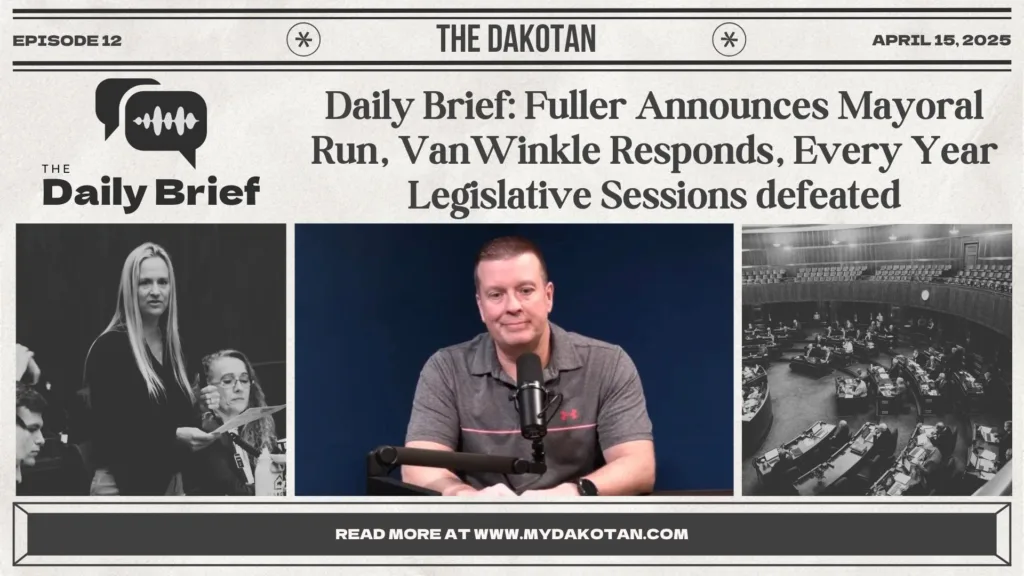

Minot Alderman Rob Fuller officially announced his candidacy for mayor in a Monday interview with Jonathan Starr. Fuller, 52, was elected to the City Council in June 2023 and now enters the special election race following the recent resignation of Mayor Tom Ross. He joins Council President Mark Jantzer and citizen Josiah Royce in the contest, promising a "fresh start" for Minot. A date for the election is expected after the next council meeting.
The North Dakota House passed a bill Monday requiring the state Ethics Commission to dismiss complaints within 180 days and removed funding for a new education-focused staff member. Supporters say the bill prevents misuse of the commission for political attacks, while critics argue the changes could hinder investigations and violate the commission’s constitutional mandate. The amended bill also allows accused individuals to speak publicly and shields lawmakers from conflict-of-interest charges if they follow ethics advice. The Senate must now decide whether to concur.
The Keystone Pipeline resumed operations Monday at reduced pressure following a 147,000-gallon oil spill in a North Dakota farm field. Federal regulators approved a cautious restart plan after South Bow replaced the damaged section and cleanup efforts recovered nearly 50,000 gallons. The failed pipe will be sent to Houston for testing, and oversight will continue as the line is tested under varying pressures.
North Dakota students will soon learn from newly revised textbooks on the state’s five Native American tribes, the first updates in nearly 30 years. Developed through a collaborative effort among the Department of Public Instruction, tribal educators, and cultural organizations, the six-part series now includes a new volume on the Sisseton-Wahpeton Oyate. The ebooks will be available free online this summer, with print copies distributed in schools by fall, aiming to help meet a 2021 law requiring Native history education in K-12 classrooms.
House Majority Leader Mike Lefor has urged Rep. Lori VanWinkle, R-Minot, to forgo a week’s pay after she missed five days of the North Dakota legislative session for a family vacation. Lefor called the absence “inappropriate,” while VanWinkle defended her decision and accused colleagues of unfair scrutiny. The debate has raised broader questions about legislative attendance, compensation, and the potential need for a formal absence policy in future sessions.
North Dakota lawmakers will continue to meet every other year after the Senate voted down a bill proposing annual sessions. Supporters of House Bill 1408 argued more frequent sessions would help the state respond faster to shifting economic conditions and make serving more accessible under new term limits. Critics, however, said it was premature to overhaul the system and urged patience as the state adjusts to legislative turnover. North Dakota remains one of just four states without yearly legislative meetings.
The North Dakota Senate narrowly passed House Bill 1318 on Monday, granting legal protections to pesticide manufacturers from liability lawsuits if their products meet EPA labeling standards. Supporters say the bill ensures farmers retain access to essential ag chemicals like Roundup and protects manufacturers from what they call “frivolous lawsuits.” Critics, including protestors outside the Capitol, warn the measure would make it nearly impossible for harmed individuals to seek justice, potentially shielding companies even if products are later linked to serious health risks. The bill now heads back to the House for concurrence on amendments.
President Trump and El Salvador's Nayib Bukele are refusing to return Kilmar Abrego Garcia, a Maryland man wrongfully deported despite a U.S. court order protecting him. The Trump administration admitted the deportation was a mistake but now says it's up to El Salvador to decide his fate—even as the Supreme Court ruled unanimously that the U.S. must facilitate his return. Critics argue the move violates due process and human rights, while Bukele insists Abrego Garcia, who has no criminal record, won't be coming back. The situation escalates tensions between the judiciary and executive over immigration and foreign policy powers.